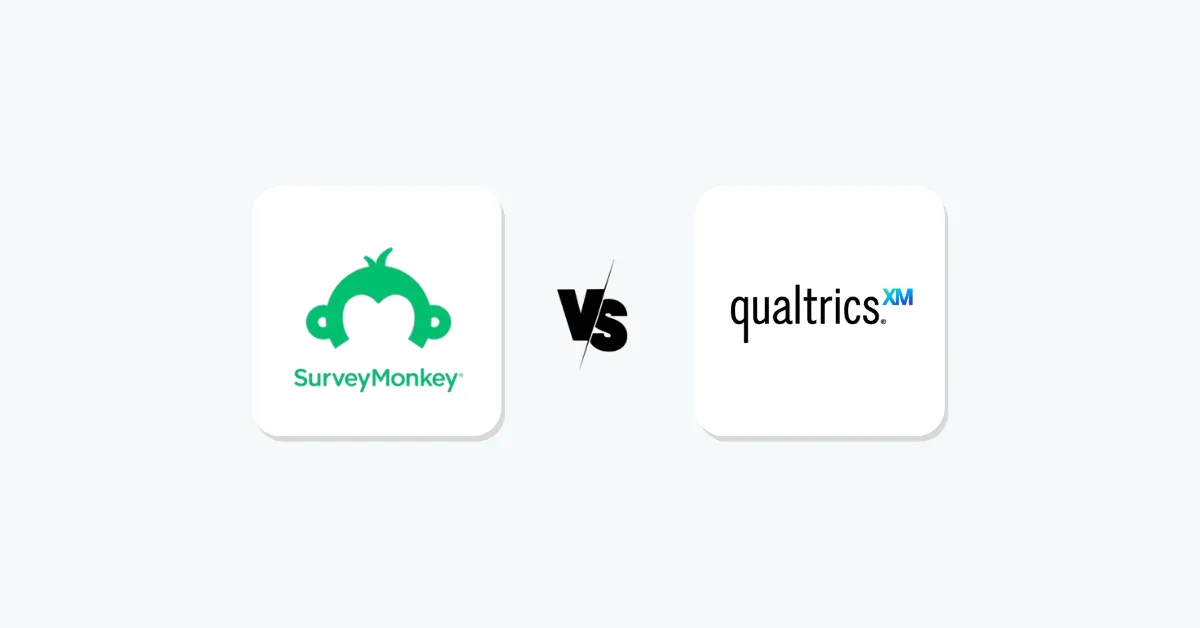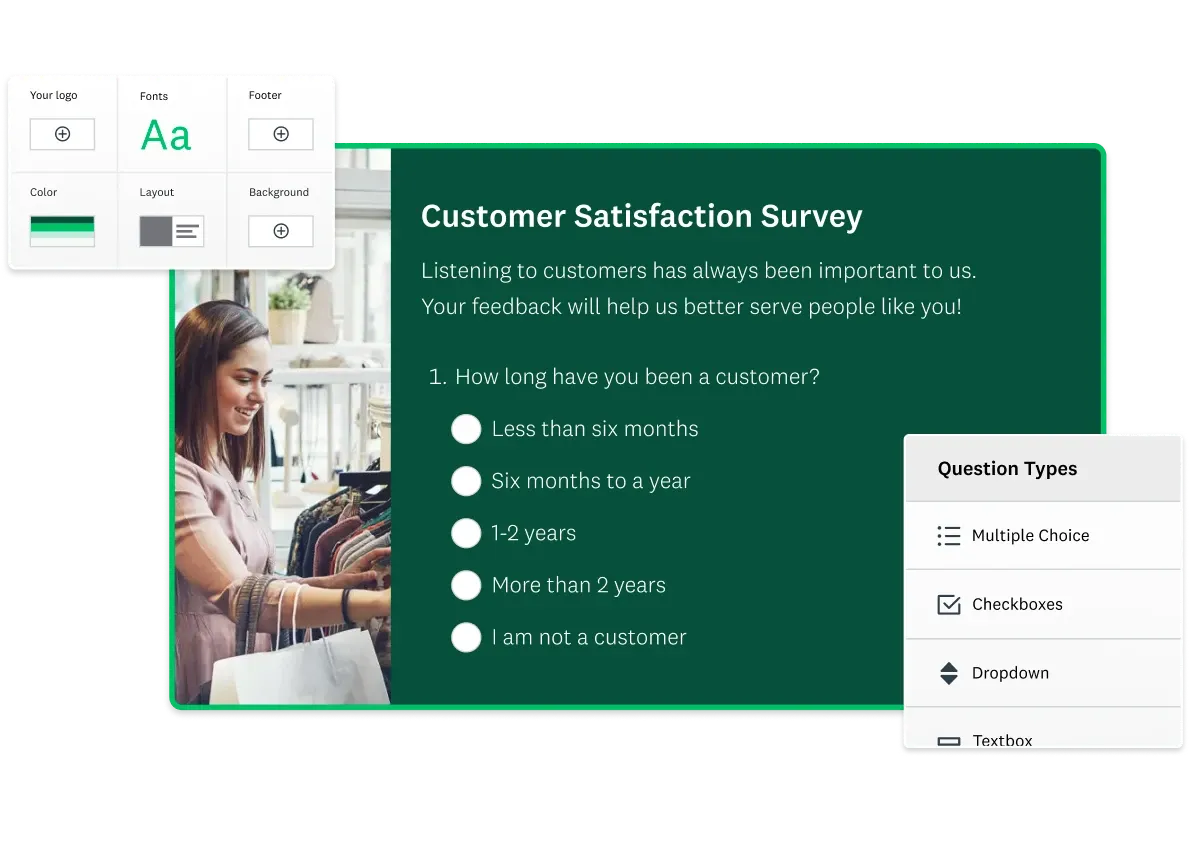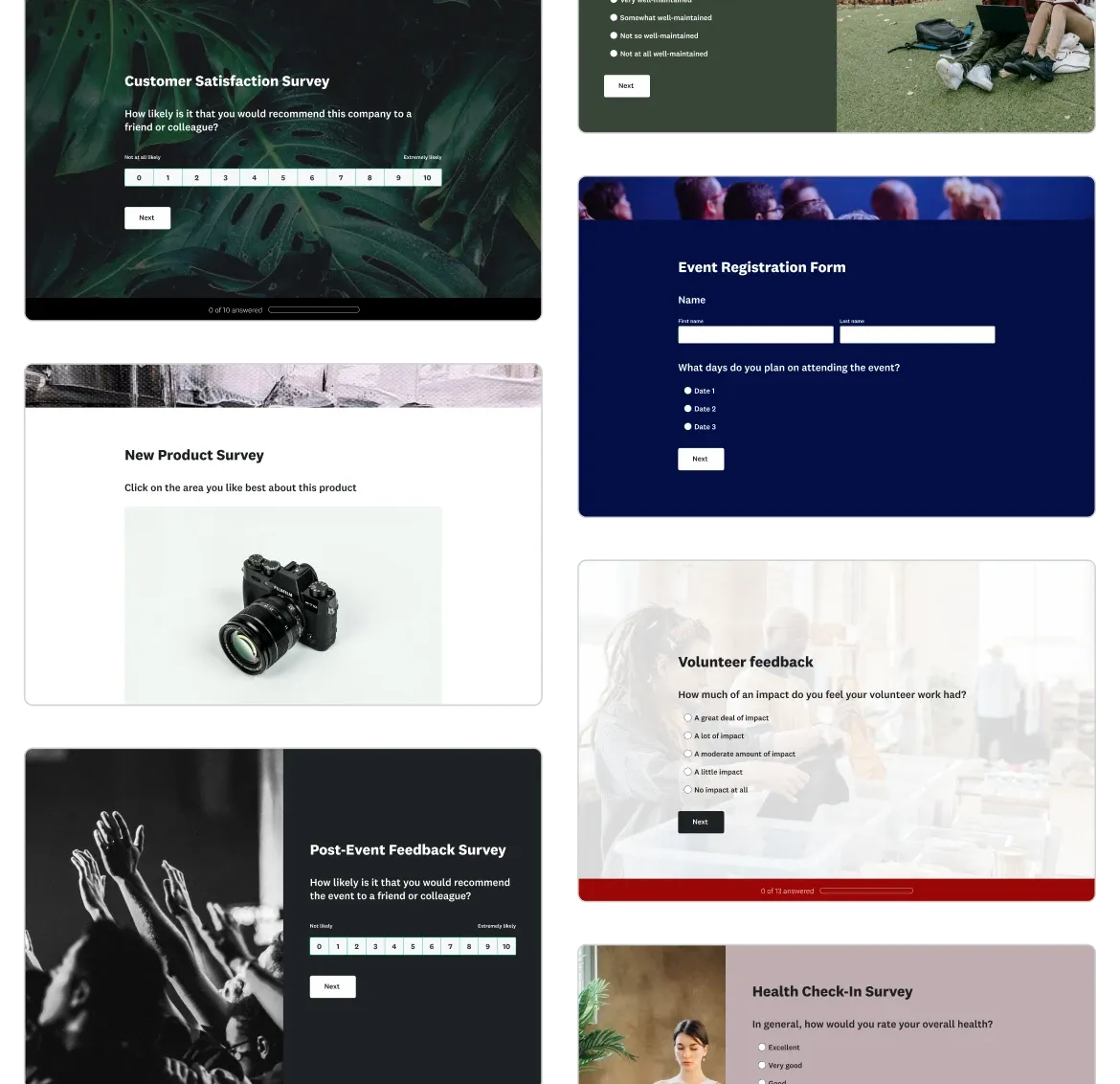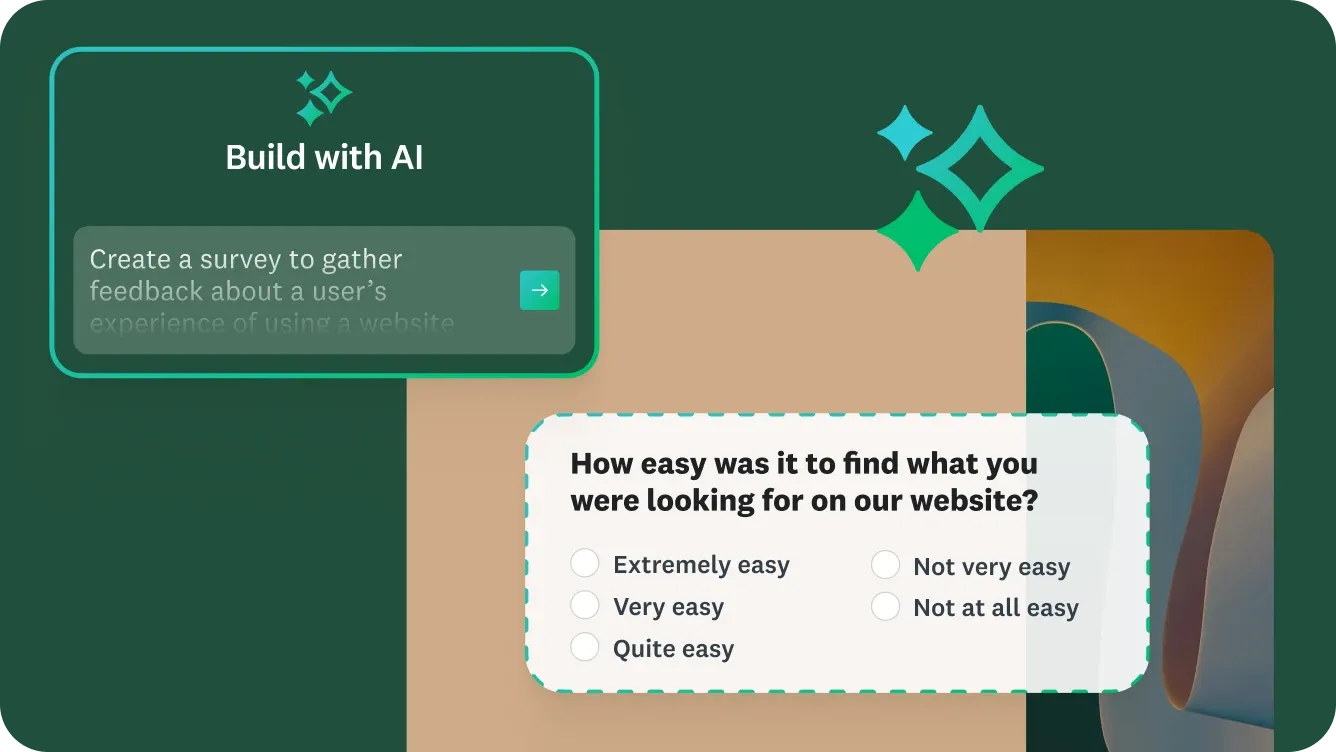
SurveyMonkey Reviews for 2026
Save 40% on your SaaS stack with expert guidance
Free Consultation
What is SurveyMonkey?
SurveyMonkey is a web-based survey and form software designed to help individuals and organizations collect, analyze, and act on feedback. Through an intuitive interface, users can build professional surveys, forms, and polls for customer feedback, employee engagement, academic research, or event planning.
The platform offers customizable templates, drag-and-drop question builders, and real-time analytics. It supports advanced features like branching logic, multilingual surveys, and automated reporting, allowing users to tailor their data collection to specific goals. AI-powered tools also help summarize open-ended responses, detect sentiment, and suggest improvements for survey design.
SurveyMonkey includes specialized products such as Surveys, Forms, and Market Research solutions, enabling teams to create data-driven insights for customer experience, HR, or marketing decisions. Its dashboards and integrations with tools like Slack, Salesforce, and Microsoft Teams streamline feedback management and collaboration.
Overall, SurveyMonkey is built for teams and professionals seeking a flexible, scalable, and data-secure platform to gather opinions, measure satisfaction, and inform business strategy.
Found in these Categories
Best For
- StartUps
- Freelancers
- Small Business
- Medium Business
- Large Enterprise
- Non-profit Organization
- Personal
SurveyMonkey Pricing
Basic
Individual Plans
Standard Monthly
Individual Plans
Advantage Annual
Individual Plans
Looking to Save Time & Money
Audit, consolidate, and save—powered by our internal buying team. Let our experts analyze your current software stack and identify opportunities for cost savings and efficiency improvements.
- Stack Audit
- Cost Reduction
- Expert Team
SurveyMonkey Features
- Answer Conditions
- Email Distribution
- Offline Response Collection
- Question Conditions
- Questions Library
- Response Management
- Skip Logic
- Customizable Templates
- Forms Creation & Design
- Artificial Intelligence (AI)
- Customizable Branding
- Question Branching
- Mobile Survey
- Multi-Language
- Data Import/Export
- Anonymous Feedback
- Sentiment Analysis
- Reporting/Analytics
- URL Customization
- Email Reminders
- API
- Response Quotas
- Activity Tracking
- AI survey summaries
- Real-time analytics
- Response limits control
- Team collaboration
- Response notifications
- A/B testing tools
- Dashboard reporting
- Survey scheduling
- Integrations library
- Survey sharing links
- Panel audience access
- Market research panels
- Automated reminders
- Survey scoring
- Password protection
- CSV and SPSS export
- Survey tracking
SurveyMonkey Integrations
-

Salesforce CRM
CRM Software
-

Adobe Marketo Engage
Marketing Automation Software
-

HubSpot CRM
CRM Software
-

Google Drive
Cloud Storage Software
-

Zapier
Data Integration Software
-

Microsoft Teams
Video Conferencing Software
-

MailChimp
Marketing Automation Software
-

OneDrive
Cloud Storage Software
-

Zoom
Video Conferencing Software
User Sentiment - SurveyMonkey Reviews
-
User-Friendly Interface
SurveyMonkey is often commended for its intuitive and user-friendly interface. Users value the speed with which they can create surveys without needing any coding knowledge, making it accessible for individuals with different levels of technical expertise. Its drag-and-drop functionality enables users to build surveys efficiently.
-
Wide Range of Question Types and Templates
The platform offers an extensive library of question types and pre-designed survey templates, which users find helpful in saving time. From multiple-choice to open-ended questions and more advanced formats like Likert scales, SurveyMonkey’s flexibility helps users create customized surveys suited to their needs.
-
Robust Data Analysis and Reporting Tools
SurveyMonkey provides strong analytical tools, allowing users to collect and analyze data in real-time. The platform offers detailed reporting features, including customizable charts, filters, and the ability to export results to formats like Excel or PDF. Users find these tools invaluable for making data-driven decisions.
-
Wide Integration Options
SurveyMonkey integrates with a variety of third-party applications, including CRM platforms (like Salesforce), collaboration tools (like Slack), and email marketing services (like Mailchimp). This allows businesses to seamlessly incorporate survey data into their existing workflows, which is a major plus for larger organizations.
-
Survey Distribution Channels
The platform allows users to distribute surveys through multiple channels, including email, social media, and websites, or through unique links. Users appreciate the flexibility in reaching their target audience, helping to increase response rates.
-
Pricing for Premium Features
SurveyMonkey provides a free version, but advanced features like in-depth data analysis, advanced reporting, and custom branding are only included in the paid plans. Some users find the premium plans to be quite expensive, particularly for smaller businesses or individual users who may not require all the features.
-
Limited Customization on Free Plan
Users on the free plan often report feeling limited in terms of survey customization options. For example, the inability to remove the SurveyMonkey branding or access to more complex question types can be restrictive for those using the free tier.
-
Response Limits for Free Accounts
The free version of SurveyMonkey caps the number of responses per survey, which can be a limitation for users who need to collect a large volume of data. The cap can hinder those conducting research or surveys with a large respondent base unless they upgrade to a paid plan.
-
Steep Learning Curve for Advanced Features
While the platform is generally easy to use, some users mention a learning curve when it comes to using advanced features such as custom reporting, logic-based branching, and data analysis. More detailed tutorials or onboarding could help users take full advantage of these capabilities.
-
Customer Support for Free Users
Several users have noted that customer support is primarily focused on paid users, with free users having limited access to direct support. This can be an issue if users encounter technical difficulties or need quick assistance with more complex features.
Leave a Review
SurveyMonkey Company Details
Own this Software?
SurveyMonkey vs. Similar Products
Select up to 3 Software, to enable Comparison
Compare Selected SoftwareEditorial Review: SurveyMonkey Deep Dive
Table of Contents
Are you looking for some answers? Do you feel like someone who has plenty of ideas in mind? But not sure if those are the right ones. Are you in the initial stages of planning and setting up a business?
If you’re looking for some fresh perspectives to build a brand, maybe you should try using an online survey software product. So let’s go into this SurveyMonkey review and find out how to take feedback and then move forward.
SurveyMonkey online survey
We found SurveyMonkey as an ideal online survey tool for intermediate questionnaire designers. With more and more companies investing in feedback and then making plans accordingly, the need for this kind of software increases.

With over 40 million registered users and trusted by startups through Fortune 500 companies, SurveyMonkey remains a powerful choice for gathering customer feedback, employee sentiment, market research, and more.
So, does all of this make it the best survey software? Let us take a closer look at the features that SurveyMonkey has to offer.
How does SurveyMonkey work? ( Free vs paid version)
SurveyMonkey offers a freemium model. The Basic (free) plan lets anyone sign up and create unlimited surveys. However, it limits each survey to 10 questions and only allows you to view up to 25 responses per survey.
You can use common question types and dozens of free templates on the Basic plan, but advanced features (like skip logic, custom branding, exporting, and all AI tools) require a paid subscription.
On paid plans (starting with “Team Advantage” and higher), SurveyMonkey removes question and response limits. Key paid-only capabilities include:
- Advanced logic (skip, display logic, randomization).
- Custom logo, themes, and URLs for branding.
- 24/7 email and phone support (even analysis prompts users to 24/7 support).
- Access to all survey templates and question banks.
- AI features (the full AI Analysis Suite and question-generation tools are on Advantage-tier and above).
- Data exports (CSV, Excel, SPSS, PDF).
- Benchmarks and statistical tests (on higher tiers).
- Team collaboration (shared libraries, real-time editing/comments, consolidated billing).
Pricing tiers vary by user count. For example, Team Advantage (3+ users) starts around €30/user/month (annual billing) and includes 50,000 responses per year. Higher tiers (Team Premier, Enterprise) add things like custom analysis reports, multilingual surveys, and enterprise-grade security (HIPAA/SSO).
How do I create a free SurveyMonkey questionnaire?
To create a new survey, click “Create Survey” in the upper-right corner after logging into your account, and choose from the options:
- Start from scratch.
- Copy and paste a survey.
- Start from a template.
Once the survey is created, you can manually add questions or choose pre-written questions from the Question Bank.
- If you are using a template, you can review and customize the questions and answers.
- After the questions are set up, you need to apply logic to the survey. This option helps the survey designer better understand the data and create a personalized survey experience for its survey takers.
- Once the above steps are completed, you can review the survey and share it with your users
SurveyMonkey features detailed
SurveyMonkey’s user interface is straightforward to use and adapt. The dashboard walks through the step-by-step process of creating, distributing, and analyzing surveys.
It also allows one to preview the survey made. In addition, all of the surveys created using SurveyMonkey as a tool can be viewed on mobile, thus making it an excellent on-the-go application.
The SurveyMonkey tool has a lot to offer its customers.
-
Templates & Question Types
SurveyMonkey offers 400+ built-in templates for common use cases (customer satisfaction, employee feedback, event registration, etc.). It supports a wide range of question types (multiple choice, ratings, Likert scales, matrix, open text, and more). Templates and an AI “Build with AI” survey creator help even beginners start fast.

-
Customization
You can fully customize survey themes, branding, logos, and URLs. Paid plans let you apply your organization’s color scheme and logo (via an AI “theme generator”) for a polished look. Advanced features include skip logic, branching, randomization, answer piping, and quotas to tailor the survey flow to each respondent.
-
Survey creation workflow
The web interface is intuitive. After logging in (even via Google/Facebook), you choose a template or start blank, drag-and-drop questions, and preview on mobile.
If you paste content or goals, SurveyMonkey’s AI-powered “Paste and Create” can auto-generate a draft questionnaire. An internal help section and resources guide new users through the process.
-
AI-Powered analysis
SurveyMonkey’s recent AI Analysis Suite lets you “chat” with your data. You can ask questions in plain English and get instant charts or segments. Open-ended responses can be auto-categorized by theme (beta) or sorted by sentiment (positive/negative) to surface key insights.

These AI tools run on decades of survey data (over 100 billion answered questions) to deliver trusted analysis. Even on paid plans, sentiment analysis and response-quality flags help you quickly zero in on what matters.
Here are the standout features for SurveyMonkey AI:- Build with AI: Describe your survey goal in a prompt, and the AI generates a survey draft in under a minute; no survey expert required.
- Question type prediction: As you type a question, the AI suggests the optimal format (multiple-choice, checkboxes, ranking, etc.).
- Answer-choice recommendations (“Answer Genius”): For any question you define, the AI proposes ready-to-use answer choices you can insert with one click.
- Survey structure & quality tips: Detects potential issues in survey flow, question clarity, or length, and suggests improvements in real time.
- Theme generation: Uses your logo, image, or brand colours to generate a polished, on-brand survey design automatically.
- Response-quality detection: Flags low-quality responses (e.g., rushed, gibberish) so you can filter them out. (Higher-tier plans)
- Sentiment & pattern analysis: Automatically categorises open-ended responses by sentiment (positive/neutral/negative) and surfaces statistically significant trends/patterns.
-
Reporting & Exports
Survey results update in real time with charts and tables. You can slice and dice data by filters, demographics, or cross-tabs. Paid users can export complete data to CSV, XLS, SPSS or PowerPoint for deeper analysis. Team plans add multi-survey analysis, which lets you compare results across surveys in an interactive dashboard.
-
Mobile-Friendly
Surveys created in SurveyMonkey are automatically mobile-optimized. Respondents can complete them on phones or tablets without additional coding. The SurveyMonkey mobile app (iOS/Android) also lets users create or launch surveys on the go.
SurveyMonkey detailed integrations
Collaboration is the key to running any business effectively. Survey data integration adds more context, color, and meaning to the data in the apps.
SurveyMonkey connects to 200+ apps. Popular integrations include Slack, Microsoft Teams, HubSpot, Mailchimp, Salesforce, Tableau, Power BI, Zoom, and many more. For example, you can sync SurveyMonkey with Salesforce or HubSpot to trigger surveys after transactions and automatically log feedback in your CRM.
The Mailchimp integration lets you embed survey links in email campaigns and analyze response data in Mailchimp. These connections help embed feedback directly into business workflows.
SurveyMonkey integration with Mailchimp
Mailchimp and SurveyMonkey – the ultimate power couple on the market. That is right. The SurveyMonkey integration brings survey templates designed by experts directly into your Mailchimp account.
In addition, this combination helps get product feedback from the customer database, which is already present in the Mailchimp account, too, in an automated manner.
With the integration all set up, you can email the prospects a survey that emphasizes the most important and relevant questions. And then, the results can be analyzed directly in Mailchimp, thus resulting in better marketing decisions in less time.
SurveyMonkey integration with Salesforce
The integration with Salesforce has indeed proven helpful for companies, as it helps every department see customer feedback in an instant. This gives a 360-degree view to the designers.
Integrating Salesforce, a widely used CRM platform, allows designers/organizations to automatically trigger surveys after any transactional events to keep track of customer sentiments. It also proves as a helpful tool in analyzing and monitoring CSATs, NPS, and other ratings.
This altogether helps in deciding what factors are contributing to the growth.
Overall, SurveyMonkey promises to deliver a positive business impact with Salesforce integration. To integrate these two, one requires an enterprise license, and once that has been taken care of, connecting SurveyMonkey to Salesforce is an easy process.
SurveyMonkey detailed alternatives
One of the factors why designers consider using SurveyMonkey’s alternatives is that it is expensive software. There are others available in the market that offer pocket-friendly mid-tier plans for business and personal use.
On the other hand, tools like Typeform match closely with SurveyMonkey in terms of design templates, integration with applications, ease of use, and a per-month subscription model.
When comparing SurveyMonkey with its top competitors, Zoho CRM and Checkbox Survey, SurveyMonkey has the highest rating because it is the easiest to use.
SurveyMonkey final verdict
We want to conclude by saying that if you are willing to pay for an annual plan and are looking for a supreme quality survey, SurveyMonkey is tough to beat. The platform is a packaged deal. It comes with 24*7 support for its paying users. It offers a seamless user experience, and the analytics tool is one of the most intelligent ones in the market.
So to sum everything up, this tool is fast, easy to use, and reliable. Moreover, it offers a variety of integrations that make it a leading survey platform around the globe, all for good reasons.
You can always start with the free version, and if you like it, you can always upgrade to paid plans as and when the need arises, because every feedback matters – no matter big or small.
So “No monkeying around with SurveyMonkey.”
SurveyMonkey Frequently Asked Questions
SurveyMonkey is a leading online survey platform that helps individuals and organizations collect feedback, conduct research, and make data-driven decisions. It’s used for customer satisfaction surveys, employee engagement, market research, and event feedback. With ready-to-use templates, AI-powered suggestions, and real-time analytics, it transforms raw opinions into actionable insights that drive smarter business outcomes.
SurveyMonkey’s AI engine helps users craft smarter, more engaging surveys by suggesting question phrasing, response types, and even optimal survey length. It analyzes responses in real time to identify trends, summarize key insights, and detect low-quality or biased data. This saves time and ensures your results are accurate, easy to interpret, and ready for presentation or decision-making.
Over 260,000 organizations worldwide use SurveyMonkey, from startups and schools to Fortune 500 companies. It’s popular among HR leaders, marketers, researchers, and nonprofits who need reliable feedback to improve performance, customer experience, or engagement. Whether you’re testing a new product or measuring employee satisfaction, SurveyMonkey adapts to your goals.
SurveyMonkey is widely used in:
- Education: To evaluate teaching quality and student satisfaction.
- Healthcare: For patient feedback and clinical research surveys.
- Technology & SaaS: To measure user experience and feature adoption.
- Professional Services: For client satisfaction and brand tracking.
Its flexibility makes it ideal for any industry that values measurable feedback.
SurveyMonkey itself doesn’t pay users to take surveys. It’s designed for businesses and researchers who want to collect feedback, not for users looking to earn. However, SurveyMonkey Audience, the company’s global research panel, compensates respondents for selected surveys through verified market research partners.
Yes. SurveyMonkey is a globally recognized, enterprise-grade survey platform trusted by top brands and institutions. It’s headquartered in the U.S. and complies with GDPR, HIPAA, and SOC 2 standards. Millions of users rely on it for secure, accurate feedback collection. If you’re invited to a SurveyMonkey survey, it’s safe, just ensure the sender is a verified organization.
SurveyMonkey collects limited technical data like IP addresses to prevent fraud and duplicate responses. However, your identity remains anonymous unless the survey creator specifically requests identifying details (like name or email). Participants can safely complete surveys without personal tracking or exposure.
Yes, but only for security and integrity purposes, to prevent spam and ensure each response is unique. IP data is stored securely and not shared with survey owners unless you grant permission or respond to a personalized survey link. SurveyMonkey adheres to strict global data protection regulations.
Yes. SurveyMonkey uses SSL encryption, access controls, and data anonymization to protect all survey data. Survey creators can choose whether responses are anonymous or identifiable. The platform’s compliance with privacy laws like GDPR and HIPAA ensures that both participants and businesses are protected at every stage.
SurveyMonkey connects seamlessly with popular business tools like Salesforce, Microsoft Teams, HubSpot, Slack, and Tableau. This allows teams to automate workflows. For example, sending surveys after customer interactions or pushing responses into dashboards for real-time reporting. These integrations make SurveyMonkey a natural part of enterprise decision-making.
While powerful, SurveyMonkey has a few limitations:
- Some advanced features require paid plans.
- Complex logic setup may take time to learn.
- Custom branding options are limited in free tiers.
Despite this, its simplicity, AI insights, and integrations make it one of the most efficient survey tools available.
Google Forms is free and great for simple surveys, while SurveyMonkey offers professional-grade analytics, AI-powered survey design, and better reporting tools. Businesses choose SurveyMonkey for its customization, advanced logic, and data visualization, ideal for teams that need more than basic form collection.
Only if you’ve chosen to collect identifiable information. By default, responses are anonymous, but you can enable response tracking via email or contact fields. This flexibility allows you to protect respondent privacy or capture precise data when needed for follow-ups or reporting.
SurveyMonkey meets globally recognized compliance standards, including:
- SOC 2 Type II Certification
- HIPAA compliance (for healthcare surveys)
- GDPR compliance for EU data
- ISO 27001 controls
These certifications demonstrate SurveyMonkey’s commitment to maintaining enterprise-level data security and confidentiality.
Alternatives like Typeform, Qualtrics, or Jotform offer unique strengths: conversational forms, deep analytics, or design flexibility. However, SurveyMonkey remains the top choice for most businesses due to its AI-assisted creation, strong integrations, and trusted brand reputation.
Yes. SurveyMonkey is used by legitimate companies, universities, and organizations to gather authentic feedback. Scam surveys may mimic the platform’s format, so always check the sender’s details before clicking links. If the survey comes from a recognized source, it’s safe and credible.
SurveyMonkey’s clients include global leaders such as Samsung, Pfizer, Greyhound, Dell, and UC Berkeley. These organizations use it to measure customer experience, employee engagement, and brand health. Its versatility and data protection make it a preferred choice across industries.
SurveyMonkey’s Team Plans enable shared survey libraries, role-based permissions, and centralized analytics dashboards. Teams can collaborate on question design, track results together, and share insights in real time. Integration with tools like Slack or Power BI helps turn feedback into fast, actionable business decisions.







